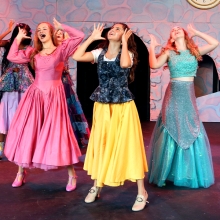Show History
History
Inspiration
Of Thee I Sing is inspired by the American political system. The musical lampoons American politics and politicians. Though inspired by the politics of the Depression-era when it was written, many have found resonance in modern politics when the show has been produced more recently.
Productions
Of Thee I Sing was a smash hit receiving critical and box office success when it opened at the Music Box Theatre on Broadway on December 26, 1931. It ran for 441 performance a mammoth run for 1930-31 and closed on January 14, 1933. The cast included William Gaxton as John P. Wintergreen, Lois Moran as Mary Turner, Grace Brinkley as Diana Devereaux, Victor Moore as Alexander Throttlebottom and George Murphy as Sam Jenkins. Sam H. Harris produced it.
Of Thee I Sing returned to Broadway several months later at the Imperial Theatre. This production opened on May 15, 1933 and ran for 32 performances before closing again on June 10, 1933. The return engagement included some of the same cast members, such as William Gaxton and Victor Moore, it also featured new actors, for example Ann Sothern in the role of Mary Turner.
The show was then revived at the Ziegfeld Theatre in 1952, running for 72 performances between May 5 and July 5.
Since then, Of Thee I Sing has been revived several times in the U.S. and in London.
The New York Gilbert and Sullivan Players did a production of Of Thee I Sing in 1990. Then, Ian Marshall Fisher's Lost Musicals series mounted a concert production at the Barbican Centre in London in August of 1996.
New York City Center Encores! did a staged concert version of the show in May of 1996. Directed by John Rando, the star-studded Encores! cast featured Victor Garber, Jefferson Mays and Jennifer Laura Thompson.
Cultural Influence
- Of Thee I Sing won the Pulitzer Prize for Drama in 1932, making it the first musical ever to do so. The Pulitzer Prize Committee stated, "Of Thee I Sing is not only coherent and well-knit enough to class as a play, but it is a biting and true satire on American politics and the public attitude towards them.... The play is genuine and it is felt the Pulitzer Prize could not serve a better purpose than to recognize such work.
- Of Thee I Sing is the second installment of a political trilogy of musicals by the Gershwins and Kaufman and Ryskind. The first show in the trilogy is Strike Up The Band, and the last is Let Em Eat Cake, which is a sequel to Of Thee I Sing.
- NPR broadcast a National Radio Theater version of Of Thee I Sing, starring John Cullum in1984; the BBC broadcast this version in both 1984 and 1992.
- In the 1930s, the Marx Brothers had intended to produce a film adaptation of the musical, but then they decided to make Duck Soup instead. Many scholars draw parallels between Of Thee I Sing and Duck Soup, even going so far as to suggest that the musical helped provide inspiration for that Marx Brothers classic.
Trivia
- Since the Pulitzer Prize was considered a literary award, George Gershwin as composer was not cited for his work on Of Thee I Sing. In 1998, at the centennial of his birth, he was posthumously awarded an honorary Pulitzer.
- All three Broadway versions of Of Thee I Sing were directed by bookwriter George S. Kaufman.
- Of Thee I Sing was William Gaxton and Victor Moore's first comedic pairing; the duo would go on to work together in six more Broadway musicals.
- Of Thee I Sing was the longest-running Gershwin show during George Gershwin's lifetime.
- Since 1918 only eight musicals have been awarded the Pulitzer Prize for Drama - of those eight, six are MTI Musicals: Of Thee I Sing (1932), Fiorello! (1960), How To Succeed... (1962), Sunday In The Park With George (1985) Rent (1996) and Next To Normal (2010).




